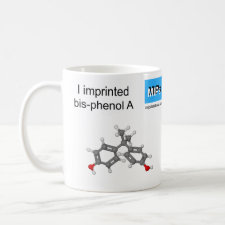
Authors: Rebocho S, Cordas CM, Viveiros R, Casimiro T
Article Title: Development of a ferrocenyl-based MIP in supercritical carbon dioxide: Towards an electrochemical sensor for bisphenol A.
Publication date: 2018
Journal: The Journal of Supercritical Fluids
Volume: 135
Page numbers: 98-104.
DOI: 10.1016/j.supflu.2018.01.006
Alternative URL: https://www.sciencedirect.com/science/article/pii/S0896844617303418
Abstract: This work describes the development of a molecular imprinted polymer (MIP)-based disposable sensor for Bisphenol A (BPA). Ferrocenylmethyl methacrylate (FMMA) was co-polymerized with ethylene glycol dimethacrylate (EGDMA) for the first time using supercritical carbon dioxide (scCO2) as porogenic solvent. This polymer was developed with affinity for BPA by molecular imprinting technique and characterized by scanning electron microscopy (SEM), Fourier transform infrared spectroscopy (FTIR), average particle size diameter and particle size distribution. Binding performance was evaluated through affinity and selectivity tests in aqueous media. MIP performance as an electrochemical sensor was studied on commercial carbon screen-printed electrodes in the presence of BPA by differential pulse voltammetry. The results show the successful detection of the BPA characteristic irreversible oxidation peak, and the increase in the current intensity response with BPA concentration (4.7-8 nM), opening a route for the development of cost-effective disposable sensitive sensors for BPA using MIP
Template and target information: bisphenol A, BPA
Author keywords: Green solvent, electrochemistry, molecular imprinting, Ferrocenylmethyl methacrylate, BPA



Join the Society for Molecular Imprinting

New items RSS feed
Sign-up for e-mail updates:
Choose between receiving an occasional newsletter or more frequent e-mail alerts.
Click here to go to the sign-up page.
Is your name elemental or peptidic? Enter your name and find out by clicking either of the buttons below!
Other products you may like:
 MIPdatabase
MIPdatabase









